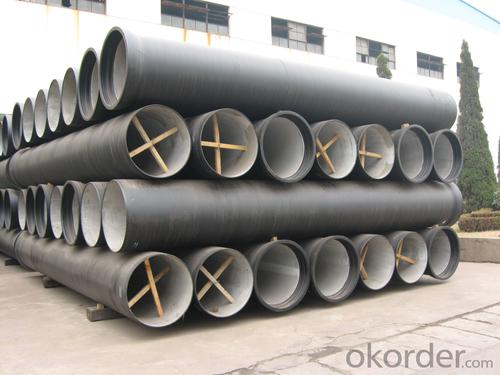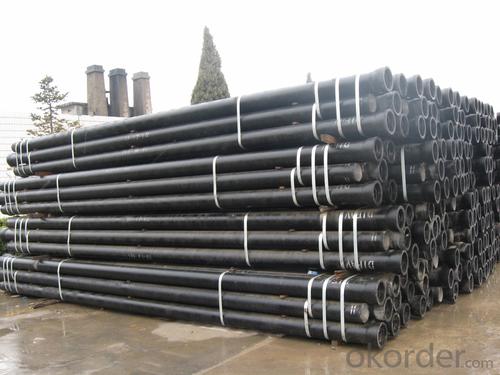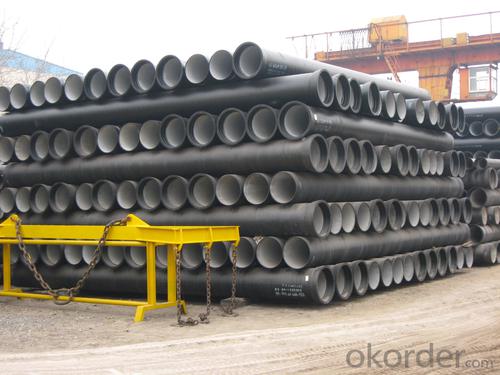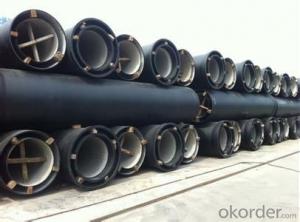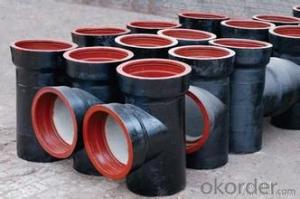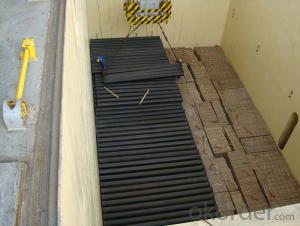DUCTILE IRON PIPE DN1200 K9
- Loading Port:
- China Main Port
- Payment Terms:
- TT OR LC
- Min Order Qty:
- -
- Supply Capability:
- -
OKorder Service Pledge
OKorder Financial Service
You Might Also Like
Specification:
1) The standard of pipe: ISO2531:1998, K9
2) Effective length: 6m
3) Inner cement line: Portland cement line as per ISO4179
4) Zinc coating: at least 130g/m2 as per ISO8179
5) Bitumen painting: at least 70um as per ISO8179
6) With 100% quantity of NBR ring, or SBR ring, or EPDM ring as per ISO4633
7) DN80mm-800mm
8) High strength, lighter than grey iron, good corrosion resistance, no furring, small flow resistance, easy fixing, long life tome about 100 yeas
9) Produced by Hangzhou chunfeng machine
10) Checked by automatic inspection equipment
11) Composition:
Chemical composition | | | | |||
Chemical composition | Ductile Cast Iron Pipe (%) | Grey iron pipe (%) | Steel pipe (%) | | | |
C | 3.5-4.0 | 3.2-3.8 | 0.1-0.2 | | | |
Si | 1.9-2.6 | 1.4-2.2 | 0.15-0.4 | | | |
Mn | 0.15-0.45 | 0.4-0.6 | 0.3-0.6 | | | |
P | ≤0.06 | ≤0.3 | 0.02-0.03 | | | |
S | ≤0.02 | ≤0.1 | 0.02-0.03 | | | |
Mg | 0.03-0.06 |
|
| | | |
12) Feature:
Mechanical properties | | | | |||
| Ductile Cast Iron Pipe | Grey Iron Pipe | Steel Pipe | | | |
Tensile Strength(Mpa) | ≥420 | 150-260 | ≥400 | | | |
Yield Strength(Mpa) | ≥300 | No Confirmation | No Confirmation | | | |
Bending Strength(Mpa) | ≥590 | 200-360 | ≥400 | | | |
Elongation (%) | ≥10 | Neglected | ≥18 | | | |
Brinell Hardness(HBS) | ≤230 | ≤230 | About 140 | | | |
13) T type mechanical joint
14) Packing: in bulk or container
- Q: Can ductile iron pipe be used for horizontal directional drilling?
- Yes, ductile iron pipe can be used for horizontal directional drilling (HDD). HDD is a trenchless method of installing underground utilities, such as pipelines, without the need for traditional open-cut trenching methods. Ductile iron pipe is often used in HDD projects due to its strength, durability, and ability to withstand the stresses and strains associated with directional drilling. It has excellent resistance to external loads and can withstand the bending and pulling forces involved in HDD installations. However, it is important to consider factors such as pipe diameter, wall thickness, and soil conditions to ensure proper pipe selection for HDD projects. Additionally, proper installation techniques and precautions should be followed to ensure the long-term performance and integrity of the ductile iron pipe in HDD applications.
- Q: How can the ductile iron pipe elbow be fixed?
- The utility model relates to a groove connecting pipe which has the function of sealing and sealing, and mainly comprises three parts: a sealing rubber ring, a clamping band and a locking bolt. The inner rubber sealing ring is arranged on the outer side of the connecting pipe and is matched with the pre rolling groove, and then the outer ring is buckled on the rubber ring, and then can be fastened with two bolts. Because of the special sealing structure design of the rubber sealing ring and the clamp hoop, the groove connecting piece has good sealing property, and the sealing property is enhanced correspondingly with the increase of the fluid pressure in the pipe.
- Q: The difference between cast iron pipe and ductile iron pipe
- Cast iron pipes, also known as pig iron pipes, ordinary gray iron. Often used in socket connection, the sealing material is usually cement rigid interface.
- Q: Are ductile iron pipes suitable for trenchless pipe ramming installations?
- Yes, ductile iron pipes are suitable for trenchless pipe ramming installations. Ductile iron is a strong and durable material that can withstand the impact and stress of the ramming process. It has excellent tensile strength and can resist cracking or breaking under pressure. Additionally, ductile iron pipes are resistant to corrosion, making them a suitable choice for underground installations. The smooth interior surface of ductile iron pipes also facilitates the flow of fluids or gases. Overall, ductile iron pipes are a reliable and cost-effective option for trenchless pipe ramming installations.
- Q: Can ductile iron pipes be used for slurry transportation?
- Yes, ductile iron pipes can be used for slurry transportation. Ductile iron pipes are known for their strength and durability, which makes them suitable for transporting various types of fluids, including slurry. They have the ability to withstand the abrasive nature of slurry and can effectively handle the pressure and flow requirements associated with slurry transportation.
- Q: Can ductile iron pipes be used for geothermal energy systems?
- Yes, ductile iron pipes can be used for geothermal energy systems. Ductile iron pipes are known for their strength, durability, and resistance to corrosion, making them suitable for various applications, including geothermal energy systems. They can effectively handle the high pressures and temperatures associated with geothermal energy production, making them a reliable choice for transporting hot water or steam. Additionally, ductile iron pipes have a long lifespan, reducing maintenance and replacement costs for geothermal energy systems.
- Q: Are ductile iron pipes resistant to chloride-induced corrosion?
- Yes, ductile iron pipes are generally resistant to chloride-induced corrosion due to their protective coating and inherent chemical composition. However, the level of resistance may vary depending on the specific environment and concentration of chlorides present. Proper maintenance and regular inspections are still important to ensure long-term durability and prevent any potential corrosion issues.
- Q: What is the expected joint deflection of ductile iron pipes?
- The expected joint deflection of ductile iron pipes depends on various factors such as the diameter of the pipe, the type of joint used, and the specific conditions of the installation. In general, ductile iron pipes are designed to accommodate some degree of deflection at the joints to allow for flexibility and movement. The American Water Works Association (AWWA) provides guidelines for the maximum allowable joint deflection for ductile iron pipes. According to AWWA C151/A21.51, the maximum deflection at the joint should typically not exceed 3 degrees or 1% of the nominal pipe diameter, whichever is greater. It is important to note that joint deflection should be within the specified limits to ensure the structural integrity and performance of the pipeline system. Excessive joint deflection can lead to leaks, failures, and reduced lifespan of the pipes. To determine the exact expected joint deflection for a specific installation, it is best to refer to the manufacturer's specifications and guidelines, as they may vary depending on the pipe size, joint type, and other factors. Consulting with a qualified engineer or contacting the manufacturer directly can provide more accurate information tailored to the specific project requirements.
- Q: What is the expected external protection system for ductile iron pipes?
- The expected external protection system for ductile iron pipes typically involves a combination of protective coatings and cathodic protection.
- Q: What does ductile iron pipe "ND200" mean?
- The nominal pipe diameter and the inner diameter and the outer diameter were not equal, for example: the nominal diameter of 100MM seamless steel pipe 102*5, 108*5 several, 108 for the outer diameter of pipes, 5 said that the wall thickness of the tube, therefore, the pipe diameter (108-5-5 = 98MM), but it is not completely equal to pipe diameter minus two times the wall thickness difference, it can be said that the nominal diameter is close to the diameter, but not equal to the diameter of a pipe diameter specifications on the design drawings, so we use the nominal diameter, the purpose is to determine according to the nominal diameter pipe, flange and gasket structure and size connecting dimensions, nominal diameter is represented by the symbol DN, if the diameter of said in the design drawings, piping specifications should also make the table, show that the nominal diameter of a pipe wall thickness.
Send your message to us
DUCTILE IRON PIPE DN1200 K9
- Loading Port:
- China Main Port
- Payment Terms:
- TT OR LC
- Min Order Qty:
- -
- Supply Capability:
- -
OKorder Service Pledge
OKorder Financial Service
Similar products
Hot products
Hot Searches
Related keywords



